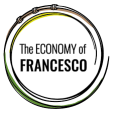Great Transition towards Planetary Health
Great Transition: The Promise and Lure of the Times Ahead. The foundational essay
"The Great Transition is a term used by the Global Scenario Group (GSG) to describe a vision of a just and sustainable global future. The term was originally used by Kenneth E. Boulding in The Meaning of the 20th Century – The Great Transition (1964), considered a hallmark conception of systems thinking and the shift from pre-modern to post-modern culture and the four possible courses of action that will allow humanity to successful journey the Great Transition.[1] The elements of the Great Transition vision include egalitarian social and ecological values, increased human interconnectedness, improved quality of life, and a healthy planet, as well as an absence of poverty, war, and environmental destruction. The Great Transition concept has been adopted by numerous individuals and organizations in the sustainability sphere (Source Wikipedia).
Great Transition Initiative
The Great Transition Initiative is an online forum of ideas and an international network for the critical exploration of concepts, strategies, and visions for a transition to a future of enriched lives, human solidarity, and a resilient biosphere. By enhancing scholarly discourse and public awareness of possibilities arising from converging social, economic, and environmental crises, and by fostering a broad network of thinkers and doers, it aims to contribute to a new praxis for global transformation.
Launched in 2003, GTI is a global network of several hundred scholars, intellectuals, civil society leaders, and activists working to develop visions and pathways for a “Great Transition" to a future of equity, solidarity and ecological sustainability. The Initiative was relaunched as an online journal and discussion network in 2014.
Great Transition: The Promise and Lure of the Times
Ahead examines the possibilities for a sustainable and desirable world. The essay describes the historic roots, future perils, and alternative pathways for world development and advances the Great Transition path as the preferred route, identifying strategies, global actors, and values for a new agenda.
Download Great Transition (PDF)
World in Transition – A Social Contract for Sustainability Flagship Report
In this report, the WBGU explains the reasons for the desperate need for a post-fossil economic strategy, yet it also concludes that the transition to sustainability is achievable, and presents ten concrete packages of measures to accelerate the imperative restructuring. If the transformation really is to succeed, we have to enter into a social contract for innovation, in the form of a new kind of discourse between governments and citizens, both within and beyond the boundaries of the nation state.
More Studies see: German Advisory Council on Global Change
- FR 2016 Urbanization
- FR 2013 Oceans
- FR 2011 A Social Contract
- FR 2008 Bioenergy
- FR 2007 Security
- FR 2004 Poverty
- FR 2003 Energy
- FR 2000 Institutions
- FR 1999 Biosphere
- FR 1998 Global Risks
- FR 1997 Water
- FR 1996 Research
- FR 1995 Global Policy
- FR 1994 Soils
- FR 1993 People-Environment
Transition Studies: Sustainable Germany I (1996), II (2008) - Misereor, Bund, EED
1995 the sustainability debate in Germany was energised by the publication of a study called ‘Sustainable Germany’, conducted – like the new study – by the Wuppertal Institute for Climate, Environment and Energy and published by Friends of the Earth Germany (BUND) and Misereor – the German Catholic Bishops’ Organisation for Development Cooperation. The question is, what has been achieved so far? What notable progress has been made? Has Germany become more sustainable?
In mid-October 2008 the study “Sustainable Germany in a Globalised World” was published just as the full extent of the crisis in global financial markets became apparent. Swiftly, the crisis in the financial markets mutated into an economic crisis, the repercussions of which are affecting more or less every
eed_bund_BfdW-course_change_09_eng.pdf
PDF-Dokument [761.9 KB]
ISCC- The Transformations to Sustainability (T2S) programme
The Transformations to Sustainability (T2S) programme supports research to help advance transformations to more sustainable and equitable societies around the globe. By generating knowledge that produces a broader and deeper understanding of the conditions, processes, outcomes and impacts of transformative social change in the context of global environmental change, the programme is intended to:
- Help craft more effective, durable and equitable solutions to the problems of environmental change and sustainability, in a context of social and cultural diversity;
- Promote the habitual use of the best knowledge about social transformations by researchers, educators, policy makers, practitioners, the private sector and citizens.
The International Social Science Council (ISSC) was established in 1952 as an independent non-government organisation. It is the primary body representing the social, economic and behavioural sciences at an international level. Its mission is to increase the production and use of social science knowledge to help solve global problems.
Transformative Knowledge Networks
Humanity on the move: Unlocking the transformative power of cities, 2016
The momentum of urbanization and its impacts are so massive that we must face up to this trend. In view of the existing cognitive, technical, economic and institutional path dependencies, a policy of business as usual – i.e. an unstructured, quasi-automatic urbanization – would lead to a non-sustainable ‘world cities society’. Only if cities and urban societies are sufficiently empowered can they make use of the opportunities for sustainability and successfully follow the urban transformation pathways. The success or failure of the Great Transformation will be decided in the cities. The WBGU discusses the relevant conditions for the success of this transformation in this report.
Download Summary, 41 pages
Download Full text, 544 pages, download as pdf (12 MB)
Global Marshall Plan. A Planetary Contract For A Worldwide Eco-Social Market Economy
The goal of the Global Marshall Plan Initiative is to establish a framework compatible with sustainability for the global economy – a global Eco-Social Market Economy. The Global Marshall Plan Initiative views itself as an integrative organizational platform for a "world in balance". Composed of a network of more than 5000 supporters from all levels of society, brought together from politics, economics and civil society, the Initiative is based on five core goals for fair globalization. Through its network-like character, it is organized through even hierarchies and without a centre. Everyone is invited to actively participate and take action with their circles and the accompanying opportunities to implement a World in Balance!








